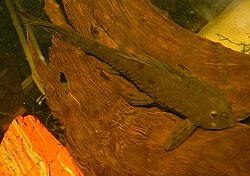Pseudorinelepis
| Pineapple pleco | |
|---|---|
 |
|
|
Not evaluated (IUCN 3.1)
|
|
| Scientific classification | |
| Kingdom: | Animalia |
| Phylum: | Chordata |
| Class: | Actinopterygii |
| Order: | Siluriformes |
| Family: | Loricariidae |
| Subfamily: | Hypostominae |
| Tribe: | Rhinelepini |
| Genus: |
Pseudorinelepis Bleeker, 1862 |
| Species: | P. genibarbis |
| Binomial name | |
|
Pseudorinelepis genibarbis (Valenciennes, 1840) |
|
| Synonyms | |
|
|
Pseudorinelepis genibarbis is a species of armored catfish native to Brazil and Peru where it is found in the Upper Amazon basin.
Pseudorinelepis is one of three genera contained in the tribe Rhinelepini, one of the tribes of Hypostominae.
Canthopomus and Monistiancistrus are synonyms of the genus Pseudorinelepis. Previously, Pseudorinelepis was a genus of four species, but now the other three species are synonymous with P. genibarbis.
P. genibarbis reaches a length of 35.6 centimetres (14.0 in) SL. They are a large, bulky Loricariid. The armor plates along the side of the fish are thick, are keeled, and encase the whole body. The adipose fin is not present. Like other members of Rhinelepini, they do not have the omega iris that is typical in most species of Loricariids. In Iquitos, Peru, it is known as carachama sin costilla, which actually means "Loricariid without ribs"; this refers to the trait that it shares with other Rhinelepini catfish that do not have ribs past the sixth vertebra.
This species is highly variable in coloration. P. genibarbis may be completely dark brown to black, mottled with tan to dark brown background and black streaks, or light tan with large, sparse spots located at base of lateral plates, fin membranes, and abdomen.
Males have longer odontodes on the cheek that are denser and more numerous than in females. It has been suggested that breeding males may also have orange on the cheeks and dorsal and caudal fin spines, although this may be restricted to fish from the Branco River.
...
Wikipedia
